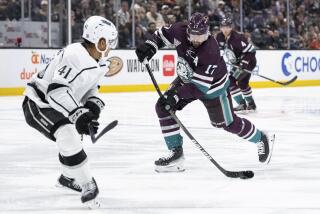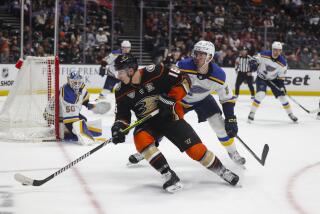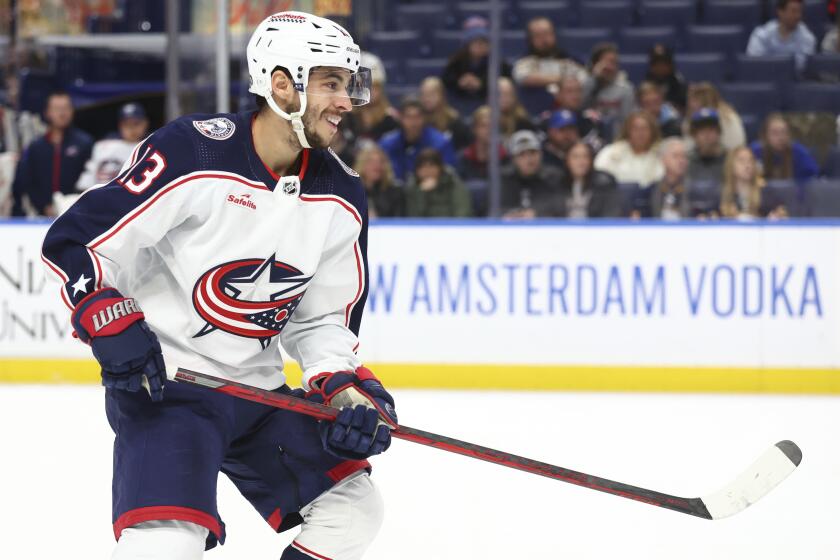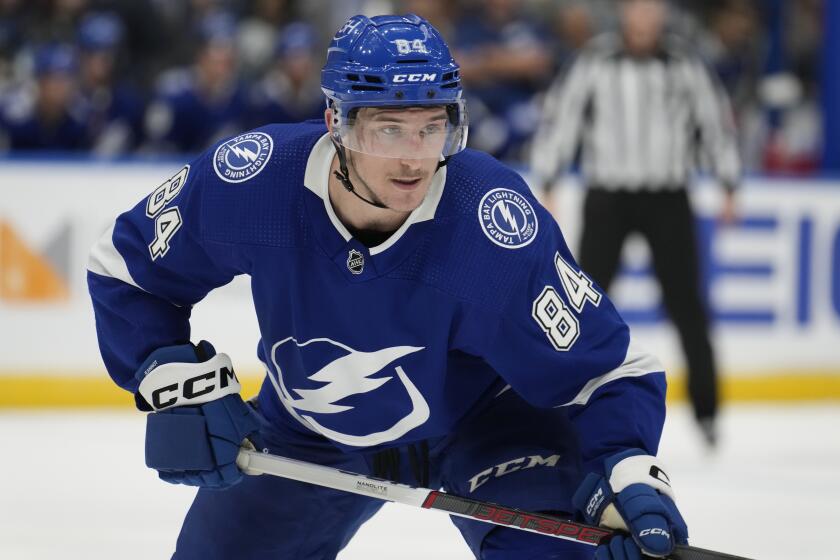In playoffs, Ducks continue their pattern of comeback victories
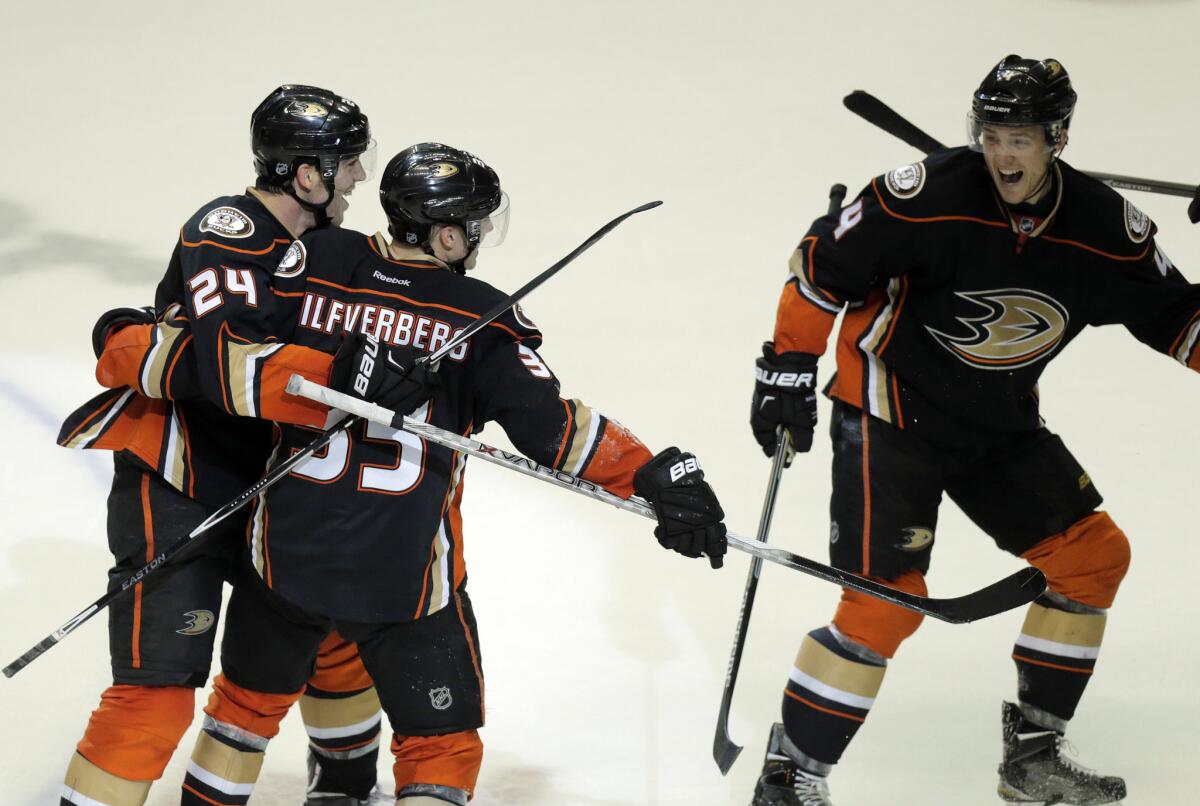
Jakob Silfverberg is congratulated by Ducks teammates Simon Despres (24) and Cam Fowler (4) after scoring the game-winning goal with 19 seconds left in Game 2 against the Jets.
It’s not that the Ducks were holding back or trying to be dramatic when they developed a pattern of falling behind in regular-season games and staging third-period rallies to escape with a point or two.
It’s not an ideal habit, but the Ducks have become escape artists to an unprecedented degree. They earned an NHL-record 18 wins in games they trailed at any point in the third period this season and 24 comeback victories overall, remarkable in a league where third-period leads once were sacred.
Continuing their year of living dangerously, the Ducks fell behind in each of their first two playoff games but drew on their resilience to rescue them. They scored three times in the third period Thursday to win their playoff opener against the Winnipeg Jets and scored twice in the third period Saturday to win Game 2, defending home ice before the series shifts to what will be a madhouse at the MTS Centre on Monday and Wednesday for the NHL’s first postseason games in Winnipeg since the original Jets made it in 1996 before moving to Phoenix.
According to the Elias Sports Bureau, the Ducks are the first NHL team to hold a 2-0 series lead after trailing to start third period in each of the first two games. That factoid alone didn’t impress defenseman Clayton Stoner when he learned about it Sunday. He does admire his teammates’ resilience and their never-say-lose attitude.
“This is my first year, and it seemed when I came here that the guys just didn’t get down, and they still believed that we would win the game, even though we were going to the third, which isn’t the same on every team,” said Stoner, who signed with the Ducks as a free agent last summer.
“There’s just confidence in the locker room knowing that they’ve been in the situation before and at no point, whether they’re up a goal or two goals, do you think you’re going to lose the game. You still believe you’re going to win. It’s calming in there, and you can just go out and do your job and play a little better, and the results will take care of themselves.”
Belief, defenseman Cam Fowler said, is “a pretty powerful thing.
“For whatever reasons, we’ve found ourselves in a lot of one-goal games, whether it’s protecting a one-goal lead or trying to erase that deficit of a one-goal game, and we’ve been able to manage it both ways,” he added. “When you do that, and you’re comfortable in those positions, it goes a long way come playoff time because there’s no panic in our group, no matter what point of the game we’re at. It’s huge.”
No question, belief is crucial. But so are hard work and a power play that was potent in the first two games.
The Ducks’ power play ranked 28th in the NHL this season at an inexplicably feeble 17.5%, which included their five-for-16 success in three games against the Jets. In the teams’ first two playoff games, the Ducks were three for seven (42.86%) and used power-play goals as springboards to victory.
Corey Perry brought the Ducks even at 2-2 early in the third period of Game 1 with a close-in rebound, and Ryan Getzlaf provided the final goal, with a man advantage, in a 4-2 decision. Patrick Maroon caused enough havoc in front of goaltender Ondrej Pavelec to redirect Fowler’s long blast and bring the teams even at 1-1 at 10:43 of the third period in Game 2, a tie broken by Jakob Silfverberg’s short-side snipe at 19:39.
It’s worth mentioning the Ducks had played only two games in eight days before Thursday’s opener, a long enough layoff to become rusty. Instead, they’ve been sharp on the power play and on the penalty kill, where they’re seven for seven.
“Towards the end of the season, yeah, we weren’t playing a whole lot of games, but it definitely gave us an opportunity to work on the things we needed to improve on, and special teams was a big part of that,” Fowler said.
“The power play was something we’ve worked very hard at, and it’s nice to see us get some results in these first couple games. We’ve been able to score big goals at critical points of the games, so hopefully we can continue to do that.”
Continuing to put themselves in position to need a third-period rally isn’t ideal, but so far, so good. “It’s been a long season, and we’ve done it a lot of times,” Silfverberg said. “But pushing it in the playoffs, I think we would like to have the lead going into the third a couple times, too.”
Twitter: @helenenothelen
More to Read
Go beyond the scoreboard
Get the latest on L.A.'s teams in the daily Sports Report newsletter.
You may occasionally receive promotional content from the Los Angeles Times.
